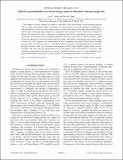| dc.contributor.author | Stein, Leo Chaim | |
| dc.contributor.author | Yunes, Nicolas | |
| dc.date.accessioned | 2011-12-05T20:53:14Z | |
| dc.date.available | 2011-12-05T20:53:14Z | |
| dc.date.issued | 2011-03 | |
| dc.date.submitted | 2010-12 | |
| dc.identifier.issn | 1550-7998 | |
| dc.identifier.issn | 1550-2368 | |
| dc.identifier.uri | http://hdl.handle.net/1721.1/67445 | |
| dc.description.abstract | The inspiral of binary systems in vacuum is controlled by the stress-energy of gravitational radiation and any other propagating degrees of freedom. For gravitational waves, the dominant contribution is characterized by an effective stress-energy tensor at future null infinity. We employ perturbation theory and the short-wavelength approximation to compute this stress-energy tensor in a wide class of alternative theories. We find that this tensor is generally a modification of that first computed by Isaacson, where the corrections can dominate over the general relativistic term. In a wide class of theories, however, these corrections identically vanish at asymptotically flat, future, null infinity, reducing the stress-energy tensor to Isaacson’s. We exemplify this phenomenon by first considering dynamical Chern-Simons modified gravity, which corrects the action via a scalar field and the contraction of the Riemann tensor and its dual. We then consider a wide class of theories with dynamical scalar fields coupled to higher-order curvature invariants and show that the gravitational wave stress-energy tensor still reduces to Isaacson’s. The calculations presented in this paper are crucial to perform systematic tests of such modified gravity theories through the orbital decay of binary pulsars or through gravitational wave observations. | en_US |
| dc.description.sponsorship | National Science Foundation (U.S.) (Grant No. PHY-0449884) | en_US |
| dc.description.sponsorship | Massachusetts Institute of Technology (Solomon Buchsbaum Fund) | en_US |
| dc.description.sponsorship | United States. National Aeronautics and Space Administration (Einstein Postdoctoral Fellowship Award No. PF9-00063) | en_US |
| dc.description.sponsorship | Chandra X-ray Center (U.S.) (No. PF0-110080) | en_US |
| dc.description.sponsorship | United States. National Aeronautics and Space Administration (NASA Contract No. NAS8-03060) | en_US |
| dc.language.iso | en_US | |
| dc.publisher | American Physical Society | en_US |
| dc.relation.isversionof | http://dx.doi.org/10.1103/PhysRevD.83.064038 | en_US |
| dc.rights | Article is made available in accordance with the publisher's policy and may be subject to US copyright law. Please refer to the publisher's site for terms of use. | en_US |
| dc.source | APS | en_US |
| dc.title | Effective gravitational wave stress-energy tensor in alternative theories of gravity | en_US |
| dc.type | Article | en_US |
| dc.identifier.citation | Stein, Leo, and Nicolás Yunes. “Effective gravitational wave stress-energy tensor in alternative theories of gravity.” Physical Review D 83.6 064038 (2011) [19 pages]. © 2011 American Physical Society. | en_US |
| dc.contributor.department | Massachusetts Institute of Technology. Department of Physics | en_US |
| dc.contributor.department | MIT Kavli Institute for Astrophysics and Space Research | en_US |
| dc.contributor.approver | Yunes, Nicolas | |
| dc.contributor.mitauthor | Stein, Leo Chaim | |
| dc.contributor.mitauthor | Yunes, Nicolas | |
| dc.relation.journal | Physical Review D | en_US |
| dc.eprint.version | Final published version | en_US |
| dc.type.uri | http://purl.org/eprint/type/JournalArticle | en_US |
| eprint.status | http://purl.org/eprint/status/PeerReviewed | en_US |
| dspace.orderedauthors | Stein, Leo; Yunes, Nicolás | en |
| mit.license | PUBLISHER_POLICY | en_US |
| mit.metadata.status | Complete | |
